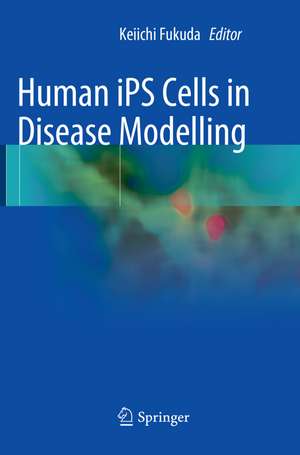Human iPS Cells in Disease Modelling
Editat de Keiichi Fukudaen Limba Engleză Paperback – 25 apr 2018
Preț: 544.18 lei
Preț vechi: 680.23 lei
-20% Nou
Puncte Express: 816
Preț estimativ în valută:
104.14€ • 108.32$ • 85.98£
104.14€ • 108.32$ • 85.98£
Carte tipărită la comandă
Livrare economică 10-16 aprilie
Preluare comenzi: 021 569.72.76
Specificații
ISBN-13: 9784431567394
ISBN-10: 4431567399
Pagini: 99
Ilustrații: VII, 99 p. 13 illus., 12 illus. in color.
Dimensiuni: 155 x 235 mm
Ediția:Softcover reprint of the original 1st ed. 2016
Editura: Springer
Colecția Springer
Locul publicării:Tokyo, Japan
ISBN-10: 4431567399
Pagini: 99
Ilustrații: VII, 99 p. 13 illus., 12 illus. in color.
Dimensiuni: 155 x 235 mm
Ediția:Softcover reprint of the original 1st ed. 2016
Editura: Springer
Colecția Springer
Locul publicării:Tokyo, Japan
Cuprins
Chapter1 Recent Improvements and Emerging Issues in iPSC Generation for the Modelingof Disease.- Chapter 2 Cardiomyopathy.- Chapter 3 Modelling ArrhythmogenicRight Ventricular Dysplasia/Cardiomyopathy with Patient-specific iPSCs.-Chapter 4 Cardiac Arrhythmia Modelling Using iPS Cells.- Chapter 5 iPSC DiseaseModeling of Laminopathies.- Chapter 6 Hematological Disorders.- Chapter 7 InheritedMetabolic Disorders of the Liver.
Notă biografică
Dr. Keiichi Fukuda obtained PhD degree in Division of Medicine, Keio University Graduate School, Japan in 1987. He started his carrier as an assistant Professor at Keio University, and promoted to full Professor in 2005. He is one of the top scientists in Japan and renowned as he had established a new therapy using regenerated cardiomyocytes obtained from stem cells.
Textul de pe ultima copertă
Human iPS cells have a great potential to be cell sources for regenerative medicine because of the promise of infinite self-renewal and the capability to differentiate into multiple cell types. This book focuses on another great potential of human iPS cells, which is the establishment of human disease models using patient-specific iPS cells. Human iPS cells can be easily obtained from a patient’s somatic cells and provide the entire information on the patient’s genome. Accordingly, we can generate disease models for inheritable diseases in cell culture dishes using iPS cells. This is a quite new technique but holds tremendous potential for our increased understanding of pathogenesis, and will then be the basis for novel drug development industries. All the authors are leading researchers in this field and they have reported many kinds of patient-derived iPS cells. In this book, they introduce the aspects that could be recapitulated in terms of disease modelling as well as further innovative findings such as novel pathogenetic insights and novel therapies.
Caracteristici
how human disease models are established by patient-derived iPS Cells a wide range of human diseases such as cardiomyopathy, laminopathy, and Alzheimer’s Is writtenby top scientists in the field of iPS cells technology Includes supplementary material: sn.pub/extras
